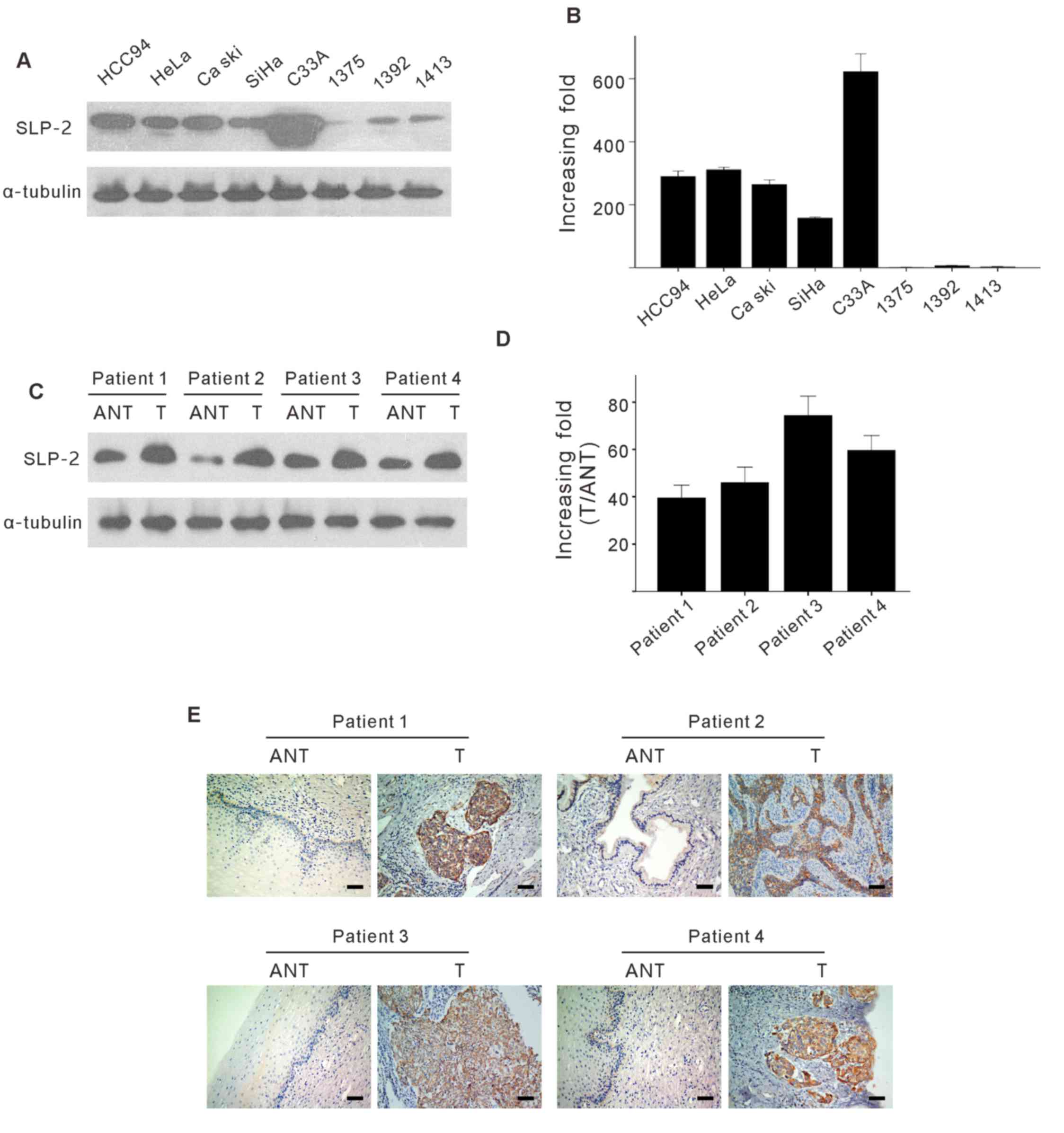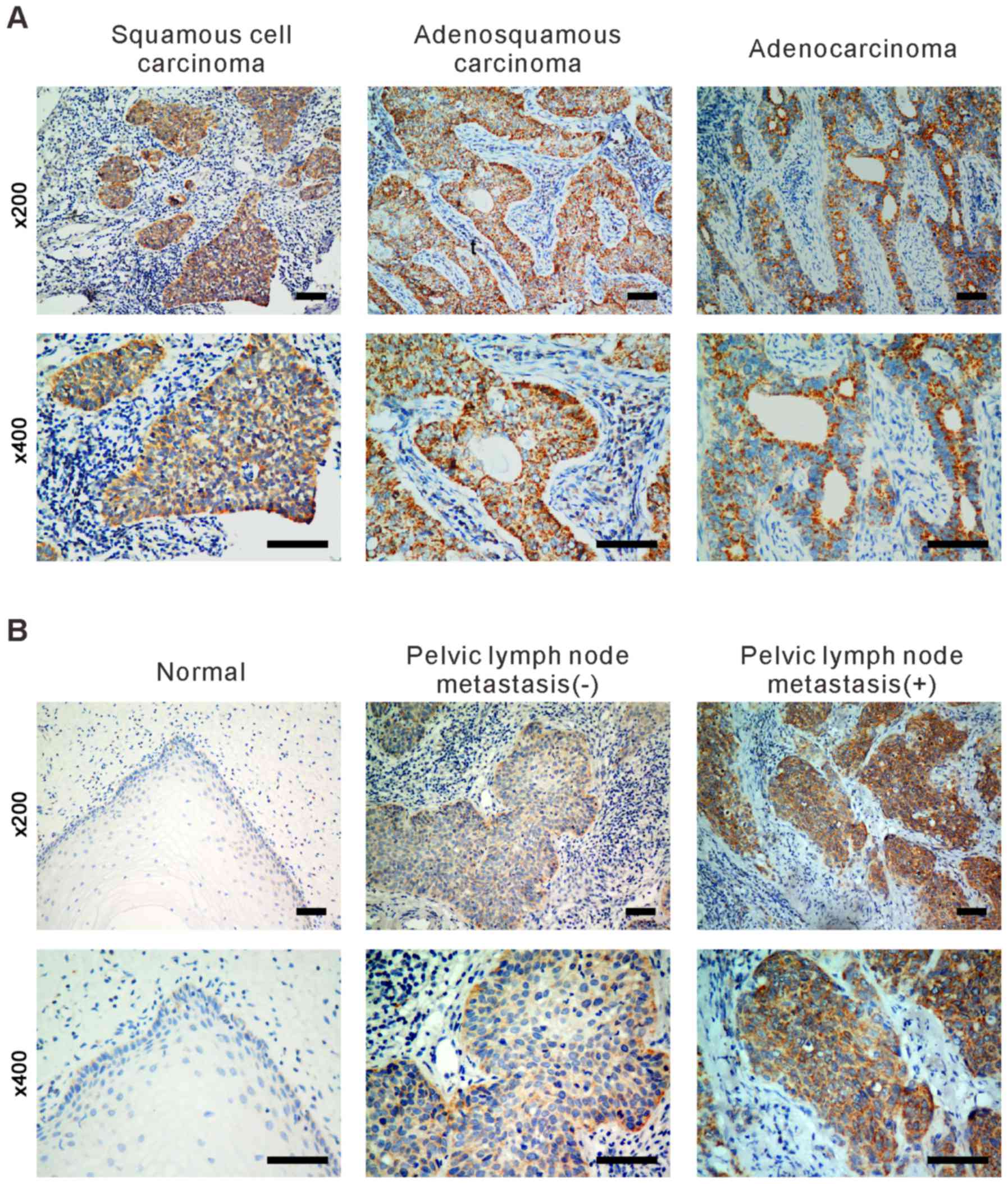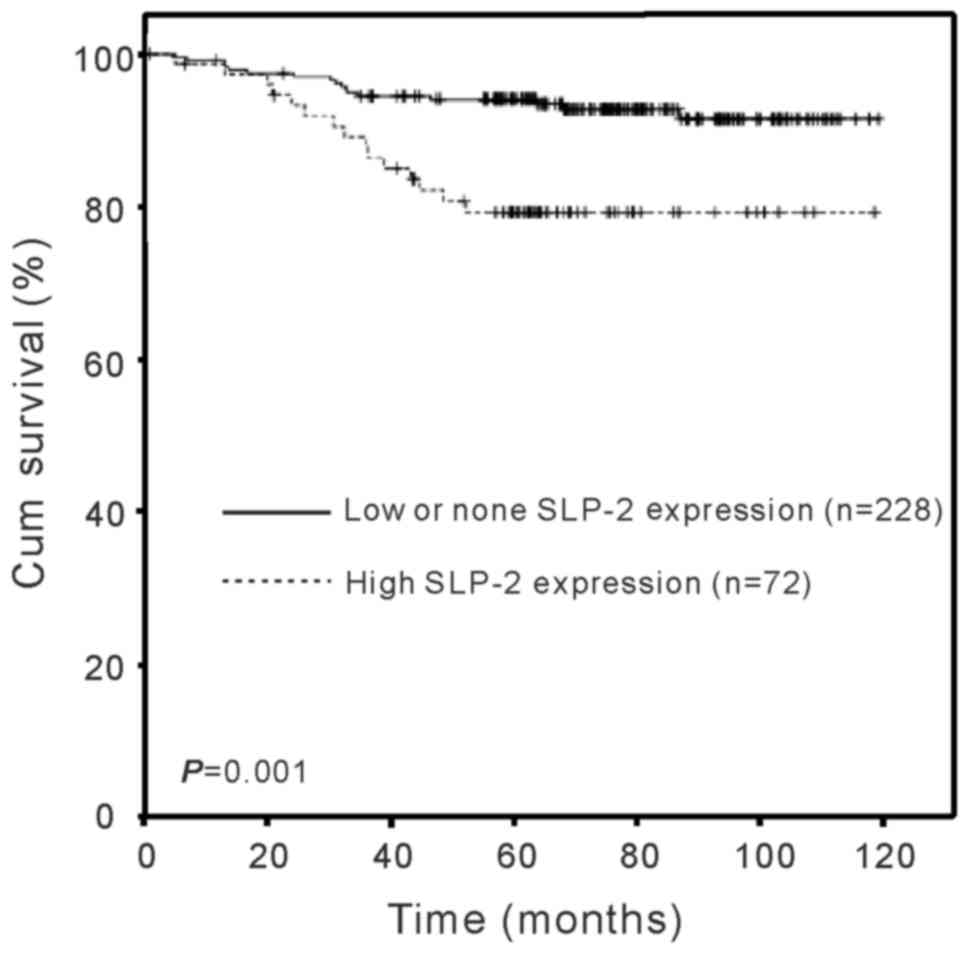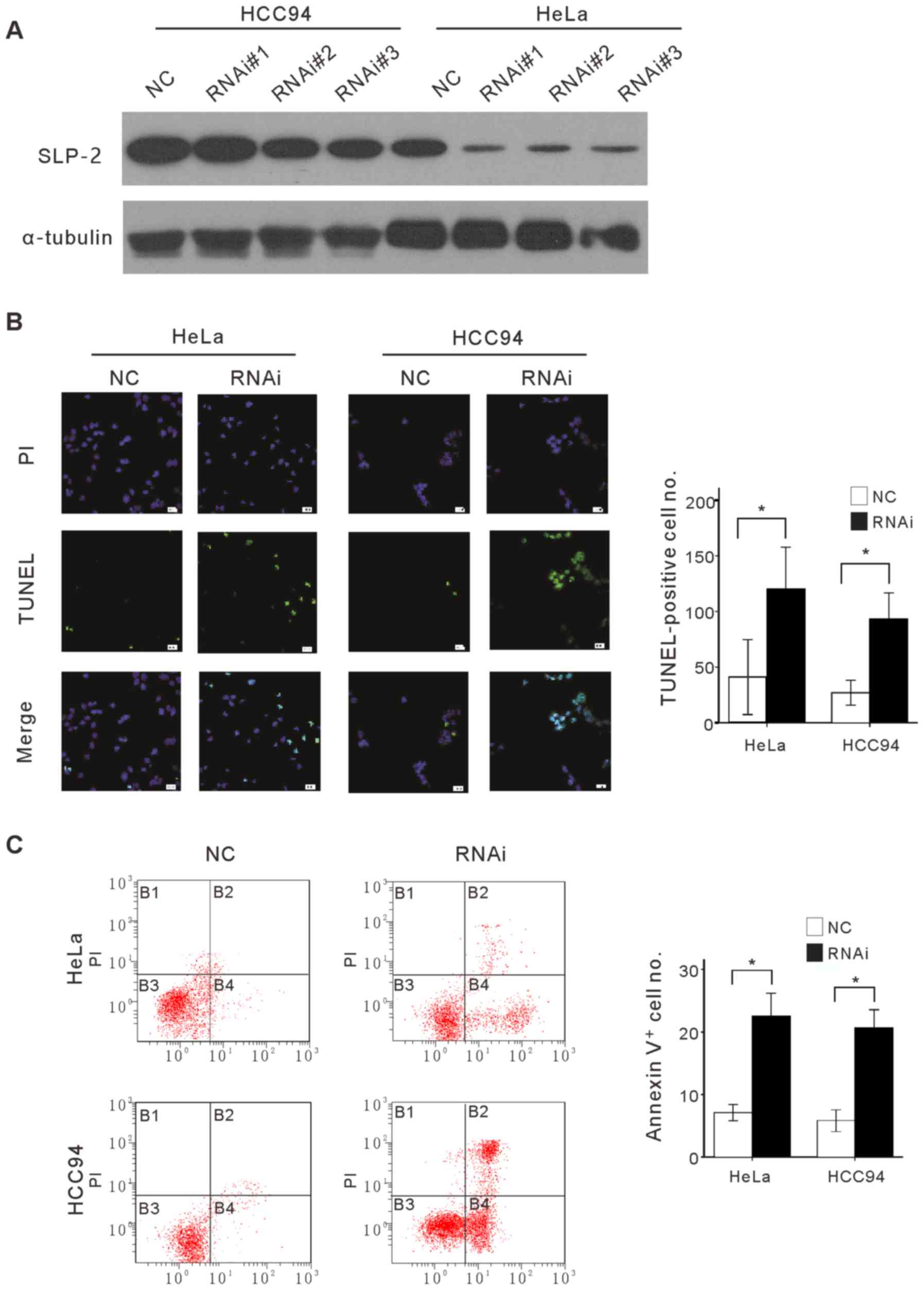|
1
|
Jemal A, Bray F, Center MM, Ferlay J, Ward
E and Forman D: Global cancer statistics. CA Cancer J Clin.
61:69–90. 2011. View Article : Google Scholar : PubMed/NCBI
|
|
2
|
Barnholtz-Sloan J, Patel N, Rollison D,
Kortepeter K, MacKinnon J and Giuliano A: Incidence trends of
invasive cervical cancer in the United States by combined race and
ethnicity. Cancer Causes Control. 20:1129–1138. 2009. View Article : Google Scholar : PubMed/NCBI
|
|
3
|
Benedet JL, Bender H, Jones H III, Ngan HY
and Pecorelli S: FIGO staging classifications and clinical practice
guidelines in the management of gynecologic cancers. FIGO Committee
on Gynecologic Oncology. Int J Gynaecol Obstet. 70:209–262. 2000.
View Article : Google Scholar : PubMed/NCBI
|
|
4
|
Sherman ME, Wang SS, Carreon J and Devesa
SS: Mortality trends for cervical squamous and adenocarcinoma in
the United States. Relation to incidence and survival. Cancer.
103:1258–1264. 2005. View Article : Google Scholar : PubMed/NCBI
|
|
5
|
Stewart GW: Stomatin. Int J Biochem Cell
Biol. 29:271–274. 1997. View Article : Google Scholar : PubMed/NCBI
|
|
6
|
Seidel G and Prohaska R: Molecular cloning
of hSLP-1, a novel human brain-specific member of the band 7/MEC-2
family similar to Caenorhabditis elegans UNC-24. Gene. 225:23–29.
1998. View Article : Google Scholar : PubMed/NCBI
|
|
7
|
Goldstein BJ, Kulaga HM and Reed RR:
Cloning and characterization of SLP3: A novel member of the
stomatin family expressed by olfactory receptor neurons. J Assoc
Res Otolaryngol. 4:74–82. 2003. View Article : Google Scholar : PubMed/NCBI
|
|
8
|
Wang Y and Morrow JS: Identification and
characterization of human SLP-2, a novel homologue of stomatin
(band 7.2b) present in erythrocytes and other tissues. J Biol Chem.
275:8062–8071. 2000. View Article : Google Scholar : PubMed/NCBI
|
|
9
|
Hajek P, Chomyn A and Attardi G:
Identification of a novel mitochondrial complex containing
mitofusin 2 and stomatin-like protein 2. J Biol Chem.
282:5670–5681. 2007. View Article : Google Scholar : PubMed/NCBI
|
|
10
|
Zhang LY, Ding F, Liu ZM, Li WD, Liu ZH
and Li YD: Effect of stomatin-like protein 2 (SLP-2) gene on growth
and proliferation of esophageal squamous carcinoma cell line TE12.
Ai Zheng. 24:155–159. 2005.(In Chinese). PubMed/NCBI
|
|
11
|
Cao WF, Zhang LY, Liu MB, Tang PZ, Liu ZH
and Sun BC: Prognostic significance of stomatin-like protein 2
overexpression in laryngeal squamous cell carcinoma: Clinical,
histologic and immunohistochemistry analyses with tissue
microarray. Hum Pathol. 38:747–752. 2007. View Article : Google Scholar : PubMed/NCBI
|
|
12
|
Zhang L, Ding F, Cao W and Liu Z, Liu W,
Yu Z, Wu Y, Li W, Li Y and Liu Z: Stomatin-like protein 2 is
overexpressed in cancer and involved in regulating cell growth and
cell adhesion in human esophageal squamous cell carcinoma. Clin
Cancer Res. 12:1639–1646. 2006. View Article : Google Scholar : PubMed/NCBI
|
|
13
|
Livak KJ and Schmittgen TD: Analysis of
relative gene expression data using real-time quantitative PCR and
the 2(-Delta Delta C(T)) method. Methods. 25:402–408. 2001.
View Article : Google Scholar : PubMed/NCBI
|
|
14
|
Chevallet M, Lescuyer P, Diemer H, van
Dorsselaer A, Leize-Wagner E and Rabilloud T: Alterations of the
mitochondrial proteome caused by the absence of mitochondrial DNA:
A proteomic view. Electrophoresis. 27:1574–1583. 2006. View Article : Google Scholar : PubMed/NCBI
|
|
15
|
Marchiole P, Buénerd A, Benchaib M, Nezhat
K, Dargent D and Mathevet P: Clinical significance of lympho
vascular space involvement and lymph node micrometastases in
early-stage cervical cancer: A retrospective case-control
surgico-pathological study. Gynecol Oncol. 97:727–732. 2005.
View Article : Google Scholar : PubMed/NCBI
|
|
16
|
Chernofsky MR, Felix JC, Muderspach LI,
Morrow CP, Ye W, Groshen SG and Roman LD: Influence of quantity of
lymph vascular space invasion on time to recurrence in women with
early-stage squamous cancer of the cervix. Gynecol Oncol.
100:288–293. 2006. View Article : Google Scholar : PubMed/NCBI
|
|
17
|
Monk BJ, Wang J, Im S, Stock RJ, Peters WA
III, Liu PY, Barrett RJ II, Berek JS, Souhami L, Grigsby PW, et al:
Rethinking the use of radiation and chemotherapy after radical
hysterectomy: A clinical-pathologic analysis of a gynecologic
oncology group/southwest oncology group/radiation therapy oncology
group trial. Gynecol Oncol. 96:721–728. 2005. View Article : Google Scholar : PubMed/NCBI
|
|
18
|
Keys HM, Bundy BN, Stehman FB, Muderspach
LI, Chafe WE, Suggs CL III, Walker JL and Gersell D: Cisplatin,
radiation, and adjuvant hysterectomy compared with radiation and
adjuvant hysterectomy for bulky stage IB cervical carcinoma. N Engl
J Med. 340:1154–1161. 1999. View Article : Google Scholar : PubMed/NCBI
|
|
19
|
Morris M, Eifel PJ, Lu J, Grigsby PW,
Levenback C, Stevens RE, Rotman M, Gershenson DM and Mutch DG:
Pelvic radiation with concurrent chemotherapy compared with pelvic
and para-aortic radiation for high-risk cervical cancer. N Engl J
Med. 340:1137–1143. 1999. View Article : Google Scholar : PubMed/NCBI
|
|
20
|
Selman TJ, Mann C, Zamora J, Appleyard TL
and Khan K: Diagnostic accuracy of tests for lymph node status in
primary cervical cancer: A systematic review and meta-analysis.
CMAJ. 178:855–862. 2008. View Article : Google Scholar : PubMed/NCBI
|
|
21
|
Anzai Y, Piccoli CW, Outwater EK, Stanford
W, Bluemke DA, Nurenberg P, Saini S, Maravilla KR, Feldman DE,
Schmiedl UP, et al: Evaluation of neck and body metastases to nodes
with ferumoxtran 10-enhanced MR imaging: Phase III safety and
efficacy study. Radiology. 228:777–788. 2003. View Article : Google Scholar : PubMed/NCBI
|
|
22
|
Kim JH, Beets GL, Kim MJ, Kessels AG and
Beets-Tan RG: High-resolution MR imaging for nodal staging in
rectal cancer: Are there any criteria in addition to the size? Eur
J Radiol. 52:78–83. 2004. View Article : Google Scholar : PubMed/NCBI
|
|
23
|
Perigaud C, Bridji B, Roussel JC, Sagan C,
Mugniot A, Duveau D, Baron O and Despins P: Prospective
preoperative mediastinal lymph node staging by integrated positron
emission tomography-computerised tomography in patients with
non-small-cell lung cancer. Eur J Cardiothorac Surg. 36:731–736.
2009. View Article : Google Scholar : PubMed/NCBI
|
|
24
|
Da Cruz S, Parone PA, Gonzalo P, Bienvenut
WV, Tondera D, Jourdain A, Quadroni M and Martinou JC: SLP-2
interacts with prohibitins in the mitochondrial inner membrane and
contributes to their stability. Biochim Biophys Acta. 1783:904–911.
2008. View Article : Google Scholar : PubMed/NCBI
|
|
25
|
Da Cruz S, De Marchi U, Frieden M, Parone
PA, Martinou JC and Demaurex N: SLP-2 negatively modulates
mitochondrial sodium-calcium exchange. Cell Calcium. 47:11–18.
2010. View Article : Google Scholar : PubMed/NCBI
|
|
26
|
Tondera D, Grandemange S, Jourdain A,
Karbowski M, Mattenberger Y, Herzig S, Da Cruz S, Clerc P, Raschke
I, Merkwirth C, et al: SLP-2 is required for stress-induced
mitochondrial hyperfusion. EMBO J. 28:1589–1600. 2009. View Article : Google Scholar : PubMed/NCBI
|
|
27
|
Wang Y, Cao W, Yu Z and Liu Z:
Downregulation of a mitochondria associated protein SLP-2 inhibits
tumor cell motility, proliferation and enhances cell sensitivity to
chemotherapeutic reagents. Cancer Biol Ther. 8:1651–1658. 2009.
View Article : Google Scholar : PubMed/NCBI
|
|
28
|
Adrain C and Martin SJ: The mitochondrial
apoptosome: A killer unleashed by the cytochrome seas. Trends
Biochem Sci. 26:390–397. 2001. View Article : Google Scholar : PubMed/NCBI
|
|
29
|
Velde C Vande, Cizeau J, Dubik D, Alimonti
J, Brown T, Israels S, Hakem R and Greenberg AH: BNIP3 and genetic
control of necrosis-like cell death through the mitochondrial
permeability transition pore. Mol Cell Biol. 20:5454–5468. 2000.
View Article : Google Scholar : PubMed/NCBI
|
|
30
|
Berridge MJ, Lipp P and Bootman MD: The
versatility and universality of calcium signalling. Nat Rev Mol
Cell Biol. 1:11–21. 2000. View
Article : Google Scholar : PubMed/NCBI
|
|
31
|
McConkey DJ and Nutt LK: Calcium flux
measurements in apoptosis. Methods Cell Biol. 66:229–246. 2001.
View Article : Google Scholar : PubMed/NCBI
|


















